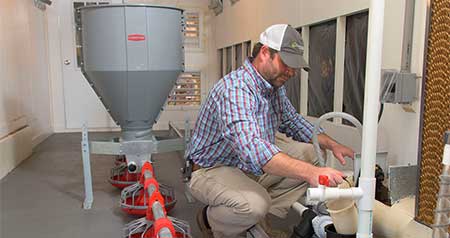News
The information presented on this page may be outdated. It may refer to situations which have changed or people who are no longer affiliated with the university. It is archived as part of Mississippi State University's history.
Extension contributes to Experiment Station energy lab upgrades

For five years, the Mississippi Agricultural and Forestry Experiment Station Mobile Environmental and Energy Lab has taken the latest developments in poultry production technology on the road. (Photo By: Kevin Hudson)
11/3/2015
By: Robert Nathan Gregory
Mississippi State University Experiment Station researchers recently used funding from the MSU Extension Service to make upgrades to the replicated poultry house on wheels and improve the learning experience for everyone who sees it.
Measuring 8 1/2 feet by 44 feet, the mobile lab is an MSU Department of Agricultural and Biological Engineering tool that can be driven to area sites. Nearly the size of an 18-wheeler, the trailer has been featured at various industrial and educational events and farms in Mississippi and Alabama.
MSU Extension associate John Linhoss said the lab is outfitted with the latest technological advances in the poultry industry. These features allow faculty to host demonstrations for multiple audiences on emerging tools designed to improve energy efficiency and profit.
"A lot of people do not realize the amount of technology used in poultry production and all of the elements—including heating, lighting, ventilation and water—needed to run a poultry house," Linhoss said. "This is a fully interactive lab that showcases the latest technology and production methods being used today in commercial broiler houses."
Linhoss said the modifications, which took about a month to install, make the unit more functional. They include new steps and new windows that allow people to view the lab from outside the van. LED lights were also installed. Future planned upgrades include a lift system.
"We had a safety and flow issue because there was only one place to enter and exit the trailer," he said. "We had one of the 36-inch fans removed and a door installed in its place to have a seamless traffic flow. We removed a piece of equipment and replaced it with Plexiglas that allows people to see what's going on from outside. We also made some plumbing improvements for the evaporative pads that show how the broiler houses are cooled."
The mobile lab has two bays. The first is a control unit where faculty can demonstrate power consumption and cooling systems in a broiler house. The second bay is a larger room showcasing various feeders and drinkers used in poultry houses, along with banks of lights that demonstrate different types of lighting used in the industry.
"When you walk into the trailer, you see a central control unit with microprocessors. All of the information from inside the trailer is fed into this unit to show real-time power consumption and to monitor the internal conditions of the trailer for temperature, relative humidity, wind speed and static pressure," Linhoss said. "It controls when the lights, ventilation fans and evaporative cooling pads are operating. It is the brain of the operation."
Extension Director Gary Jackson said the mobile lab is crucial to illustrating the job opportunities available in the state's poultry industry, which had a production value of $2.87 billion in 2014 and is Mississippi's largest agricultural commodity.
"What makes the Mobile Environmental and Energy Lab such an excellent platform is its versatility," Jackson said. "It has traveled across the state and provided hands-on education to people in the poultry industry, but it has also reached hundreds of grade-school students and teachers. Extension is pleased to support the efforts of the Department of Agricultural and Biological Engineering at MSU to use the lab as a tool for outreach."
Linhoss said the department recently showcased the lab to more than 750 students at career fairs in Tupelo, Mississippi, and Tuscaloosa, Alabama.
"Without the modifications that were made with Extension's contribution, there is no way we would have been able to accommodate nearly as many people," Linhoss said. "It's fun to see a group of eighth-graders' eyes light up when you show them the amount of technology and mechanization involved in the poultry industry."
Daniel Chesser, a research associate in the Mississippi Agricultural and Forestry Experiment Station, said the goal going forward is to make the mobile poultry house project sustainable through funding from industry partners and grants.
"This is both a research and outreach unit that costs a significant amount of money to run," Chesser said. "We are excited about getting the trailer out to more events and making more modifications to it to make it an even more useful educational tool. The increased visibility these capacity upgrades have allowed will take us a long way."
View More News